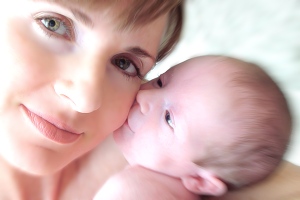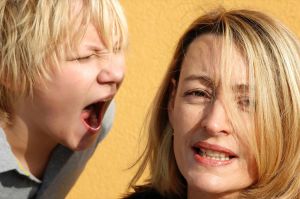Helicopter Parenting. Free-Range Parenting. Attachment Parenting. Natural Parenting. Feminist Parenting. I could list may more but the point in each is the same: each offers a way, a method for producing the perfect child…and if not the perfect child, at least a well-adjusted, responsible, conscientious adult who remembers to recycle, sponsor children in developing nations and call home occasionally. Underlying the near-obsession with parenting and parenting-styles is the assumption that parents—and specifically mothers—are responsible for how their children turn out.
occasionally. Underlying the near-obsession with parenting and parenting-styles is the assumption that parents—and specifically mothers—are responsible for how their children turn out.
Some may find my emphasis here on mothers surprising, but from Adrianne Rich’s Of Woman Born, through Sara Ruddick’s Maternal Thinking, to more recent popular works like The New Momism, the general scholarly and popular academic consensus is that, for better or worse, mothers are judged, critiqued and blamed for the behaviors of their children. When something bad happens, it is the mother’s fault. Always. There is even a term for it: mother-blame. (For a really terrible, recent example of this on a legal scale, see “This week in mother-blaming”) Mother-blame is so ingrained in the culture that, a few years ago, a Google search for “bad fathering” returned with: “Did you mean ‘bad mothering’” . (This no longer happens partly because there are so many websites that cover the incident.)
While the implicit sexism and assumed guilt of the mother that characterizes mother-blame are both quite interesting, what interests me more is why it is that I find myself engaging in mother-blame. Why do I feel compelled (at least in my own head) to mutter a “tsk, tsk” or think “It’s all because she…”? I know what mother-blame is, I think it is a bad practice that fails to take into account a  whole host of other factors, not to mention sheer, dumb luck/misfortune, and yet I find myself unintentionally judging mothers’ actions and blaming them for tragedies.
whole host of other factors, not to mention sheer, dumb luck/misfortune, and yet I find myself unintentionally judging mothers’ actions and blaming them for tragedies.
Why is it that, when terrible things happen, especially to children, we blame the mother? Surprisingly, I think part of the answer may lie in the biblical book of Job. Now, Job has everything and then, bit by bit, his life falls apart: the loss of his property, the loss of his health, the loss of his family. His friends keep coming to him and, in trying to console him, keep insisting that the tragedies are his fault: he must have sinned in some way. Fortunately, the biblical text is emphatic that Job did not bring all this tragedy upon himself; in fact, the frame-story for the book is that Job is a man that God recognizes as having exemplary faith.
So, how does this relate to mother-blame? Just as Job’s friends incorrectly blame him for the tragedy he suffers, we likewise unjustly blame mothers for the tragedies and misfortunes their children suffer and that mothers suffer through their children. Why? We critique and blame mothers (and others generally) because, as long as we can identify and condemn their poor choices, bad behavior, or flawed parenting methods, then we think that we can avoid tragedy. This sort of criticism-based blame gives us the illusion of control, the false sense that our better judgment will allow us and our families to stave-off suffering and lead happy, healthy, well-adjusted lives. I reckon this is exactly why Job’s friends were so keen to find some hidden sin in his life: such a sin would mean that—so long as they kept themselves from free from such wrongdoing—they wouldn’t suffer like Job.
would mean that—so long as they kept themselves from free from such wrongdoing—they wouldn’t suffer like Job.
While Job’s story ends without giving any real answers about why we suffer and the problem of evil remains exactly that—a problem—focusing solely on the theodicy can cause us to miss some of the great gifts of the book of Job, the lessons in humility and freedom that Job’s story offers us. Blaming the mother/blaming Job…either way, you cannot control what the future will bring any more than your suffering friend/family member/fellow human being could. And if you are suffering inexplicable tragedy, loss…it is not your fault.
Jessica Hughes

Maybe we blame the mother because sometimes we blame ourselves? How many times has someone made an innocent remark to me about my parenting, and it gets under my skin, and I know it shouldn’t bother me, but it does. Am I going to ruin my child for life? I know that I’m not, but if there’s even a small chance because I’m doing this, or not doing that, then maybe…
There’s so much pressure on mothers, but for the most part, I do think it starts and should end with ourselves. If we can just lighten up a bit, give ourselves a break, we could take the outside criticism in stride.
Which is why I wanted to write a mommy blog in the first place. Because being a mom is the hardest, but best thing in the world, and we need to stop criticizing ourselves (and each other), and start celebrating in the joys that motherhood bring.
Cheers! Amy
Amy, thank you so much for your comment. You are certainly right that mothers frequently blame themselves, although it is probably a “chicken and egg” situation where mothers blame themselves because society invites them to blame themselves. It is interesting, though, that “Father Blame” doesn’t exist to the same extent and so it would be intriguing to know if men blame themselves as women do. From much of my reading in motherhood studies, it seems that fathers often blame the mother and not themselves when things go wrong! (But that may also reflect the bias inherent in motherhood studies.) As parenting trends continue to be a focus of public discourse—and especially as such trends develop huge marketing apparatuses promising parents the moon—it seems that one is wise to remember that there are no guarantees as to how a child will turn out, regardless of what one does or does not do…a thought which is both freeing and terrifying!
It could be argued, perhaps, that social attention is directed more toward mothers during a child’s pre- and early-adolescent years, but that there is an often discrete shift that begins to occur during the child’s mid- and post-adolescence years. I know this to be particularly true for young men, but it seems to be often consistent with women as well: that many personal demons struggled through as an adult—being that the son or daughter is at a more mature cognitive and spiritual place to identify them than during younger years—are somehow rooted in the relationship with the father figure. It is not uncommon—some would suggest that it is even natural and healthy with regard to development—that a son or daughter shifts a larger portion of his or her energy previously directed toward the mother figure toward the father figure in the late teen period. Again, this is particularly true and important for young men, who upon entering manhood are looking for a guide(s) to help them through that initiation. But it does seem even true for many young women who may be, for example, searching for a model of manhood by which to measure their male peers as potential husbands and future fathers. This is a critical period for young people, and yet it seems to be poorly handled or often neglected by father figures. Further examples: the common insecurities of both young men and women, manifested through seeking love and affirmation through pre-marital sex or even homosexuality. It is certainly more complicated than that, but the point is that it seems that both men and women have an identifiable responsibility in raising their children. Society does seem to recognize this to some degree. In the art world, broken father relationships seem to be at the epicenter of story arches or character development than broken mother relationships.
The father’s responsibility does not seem to be identified, encouraged, and challenged enough, especially by the Church; but I have seen that consciousness shifting. Mothers do often seem to receive much of the weight of responsibility during a majority of a child’s life, to which if the father is less present in that responsibility there may be a detrimental trend established for the future when the maturing child needs him the most—at which point, it may be added, for example, that a mother figure may have difficulty in allowing and trusting the father figure to take on a greater role if he manages to rise out of that passivity. Fathers have an invaluable role in raising their child. If they are not receiving enough attention in sociological and psychological assessments of parenting, which I am not sure is exactly the case, then they certainly need to. Regardless, thank you, mothers, for your tireless efforts.
I should add that I really appreciate your thoughts, Jessica; that to me they are very refreshing on the subject. Thank you for sharing them. My thoughts outlined above, to clarify, are not so much in contrast to yours–though I may contend slightly with the idea that all opinion is directed against mothers for the development of children–but rather in addition to it. I hope, merely, to offer another lens through which to discuss the complexity of parenthood. Hopefully there is truth within my words.
Regardless, thank you again for stimulating my thinking.
Joshua, thank you so much for your thoughts. You are completely right about the shift that takes place in early adolescents to the father. In psychoanalytic theory this is seen as an important part of becoming individuated from the mother and, according to some more pessimistic theorists, being initiated into patriarchy. I was using the language of “children” pretty specifically, thinking of those under 10 as opposed to adolescents, since this is (as you rightly point out) the stage when the mother is frequently given primary responsibility.
While you are right that we often negate the importance of the role of the father in developing healthy adults, I would say that the principle I was writing aboutof blaming other for their sins as an explanation of tragedy and a means of hoping to ward off catastrophe in one’s own lifeapplies to fathers as well. Strong, gracious, and loving father-figures do not guarantee that a daughter won’t get pregnant at 16 or that a son won’t flunk out of college, or that a child won’t be killed while driving home from a party drunk. Of course, at this age (more than when thinking about a baby or a toddler) the young person’s own decisions and will have to also be taken into account but, in the face of teenage and young adult tragedies, I’d say the same thing I said in this blog: don’t blame the father. Doing things well is no guarantee that tragedy can be avoided and, more importantly, he may have done his work of fathering very, very well.
I agree.